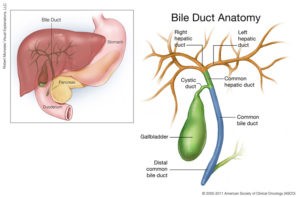
Diagnosed with Cancer? Your two greatest challenges are understanding cancer and understanding possible side effects from chemo and radiation. Knowledge is Power!
Learn about conventional, complementary, and integrative therapies.
Dealing with treatment side effects? Learn about evidence-based therapies to alleviate your symptoms.
Click the orange button to the right to learn more.
- You are here:
- Home »
- Blog »
- side effects ID and prevention »
- Gene testing- Bile Duct Cancer
Gene testing- Bile Duct Cancer

“Identifying this new and relatively common mutation in intrahepatic bile duct cancer may have significant implications for the diagnosis, prognosis and therapy of patients whose tumors harbor this mutation.”
I have good news and bad news. The bad news is that biliary tract/bile duct cancer is considered incurable by conventional oncology. The “incurable” label simply means that conventional oncology hasn’t figured out how to treat bile duct cancer.
In fact, there are many cancers depending on the stage of diagnosis that are considered to be incurable by conventional oncology. In support of conventional oncology, cancer is an incredibly complicated disease. My cancer, multiple myeloma, has a 45% five year survival rate. I was diagnosed in 2/94. MM is complicted and genetically diverse. Which brings me to the point of this post.
One-size-fits all chemotherapy doesn’t help the bile duct cancer patient much. It is important therefore, to tailor chemotherapy as specifically as possible to the patient’s specific cancer. Doctors have found a new genetic signature useful for diagnosing bile duct cancer.
I am both a cancer survivor and cancer coach. I have lived with an “incurable” cancer since 1994. My experience has taught me to consider both conventional (FDA approved) and evidence-based, non-conventional therapies.
Scroll down the page and post a question or comment and I will reply to you ASAP.
Thank you,
David Emerson
- Cancer Survivor
- Cancer Coach
- Director PeopleBeatingCancer
Recommended Reading:
- Cholangiocarcinoma aka Biliary Tract Cancer: To treat or not to treat?
- Nutrition Research and The Cancer Survivor’s Diet
- Chemo Combo Improves Survival of Patients with Advanced Biliary Tract Cancer
Cholangiocarcinoma
Novel gene mutations associated with bile duct cancer
Genomic sequencing used to help identify new therapies for bile duct cancer
“Physicians at Mayo Clinic’s Individualized Medicine Clinic and researchers at the Translational Genomics Research Institute (TGen) have personalized drug treatments for patients with cholangiocarcinoma using genomic sequencing technologies. Potential new treatment approaches are being validated to develop new tests that physicians can use to guide therapy for this aggressive cancer of the bile ducts that progresses quickly and is difficult to treat…”


